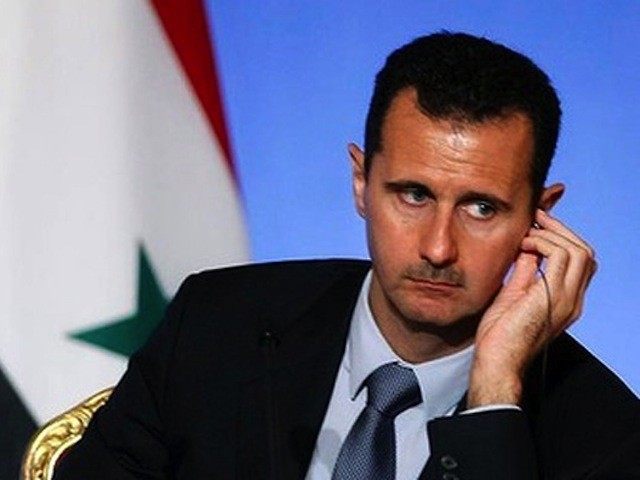According to the Associated Press, Syrian dictator Bashar al-Assad is open to discussing cooperating with the United States—years after President Obama’s chemical weapons “red line” debacle—but demands respect as a legitimate ruler despite cementing power in an election the State Department openly called a “sham.”
Assad’s position changed when his enemies in the Islamic State became the top American foreign policy crisis. The hoary old “enemy of my enemy is my friend” chestnut has rarely produced a more unappealing “enemy of my enemy” than Bashar al-Assad.
As a matter of simple strategic reality, ISIS, al-Qaeda, and their allies have long been the most effective military elements of the Syrian rebellion, so taking ISIS down helps Assad. The strategy envisioned for taking ISIS down helps Assad even more because it relies on arming and training good-guy moderate Syrian rebels to fight ISIS instead of Assad.
At the moment ISIS became the West’s principal adversary in the region, Assad was already thought to be slowly and painfully winning the civil war. His position was made more secure by Barack Obama and John Kerry’s helpless fumbling in the “red line” disaster, a resounding diplomatic victory for Assad’s Russian patron Vladimir Putin.
Even former Secretary of Defense and CIA chief Leon Panetta thought Obama’s red-line blunder represented a catastrophic loss of American credibility. Assad’s credibility was correspondingly increased, as he became the dictator who survived Obama’s regime-change bluster without breaking a sweat.
Assad is also a notable client of the Iranian empire, which Obama foreign policy is designed to protect and nourish, granting the world’s worst sponsors of international terrorism both atomic weapons, regional influence, and diplomatic prestige. At some point, Obama’s vision of Iran as the regional hegemon America can do business with will necessarily involve reconciliation with its pet strongman in Damascus.
Assad can also tell the civilized world that his regime represents stability and better protection for besieged religious minorities than anything the Islamist-dominated rebellion can offer. The persecution of such groups is a humanitarian crisis that has captured the world’s attention. Assad was always shrewd about protecting Syrian minorities, as a member of one himself, the relatively small Alawite sect of Shia Islam.
The Syrian regime’s use of WMDs and indiscriminate conventional arms, such as the notorious helicopter-dropped “barrel bombs,” are among the biggest sticking points against folding Syria into Obama’s Big Iran strategy. The Associated Press quotes from a CBS News interview in which Assad denied using those brutal weapons, dismissing accusations to the contrary as “malicious propaganda.”
While humanitarian organizations such as Doctors Without Borders have verified that chemical weapons were used in strikes against towns held by the rebels, Assad insists these were false-flag operations carried out by the rebels using stolen chemical munitions. He is careful to refer to his opposition as “terrorists.”
Secretary of State Kerry is hovering around Syria again, making comments that Washington must now reach an understanding with the regime Obama vowed to depose just two years ago, ultimately achieving a negotiated resolution to the Syrian civil war. “Every dialogue is a positive thing, and we are going to be open to a dialogue with anyone, including the United States,” said Assad. He insisted such dialogue “must be based on mutual respect.”
That is a signal to the Obama administration that a bit of groveling will be expected, as they formally acknowledge the legitimacy of a regime they formally accused of breaking one of the ultimate taboos of civilized behavior—perhaps the only real taboo remaining.
Despite that fact, the ISIS problem Obama negligently allowed to fester into a fully operational cross-border terror state has turned Assad into a de facto U.S. ally, strongly aligned with Obama’s Iranian “partners in peace.”
Assad is making it clear that dialogue will include a strong concession of legitimacy from the defeated Obama team, and even then, the U.S. would be playing second fiddle to Assad’s best friends in Russia, as he speaks of welcoming Russian military bases “in the eastern Mediterranean, and specifically on the Syrian shores and in Syrian ports.”
Obama envisions a stable Middle East under Iranian domination; Russia will own real estate there, and they will take it without firing a shot, while the United States serves as the air force for both Syria and Iran against ISIS. What a brilliant geopolitical strategist we have in the White House!

COMMENTS
Please let us know if you're having issues with commenting.